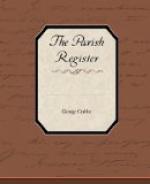When ale was cheap and bachelors were bold:
His heroes all were famous in their days,
Cheats were his boast, and drunkards had his praise;
“One, in three draughts, three mugs of ale took down,
As mugs were then—the champion of the Crown;
For thrice three days another lived on ale,
And knew no change but that of mild and stale;
Two thirsty soakers watch’d a vessel’s side,
When he the tap, with dext’rous hand, applied;
Nor from their seats departed, till they found
That butt was out and heard the mournful sound.”
He praised a poacher, precious child of fun!
Who shot the keeper with his own spring gun;
Nor less the smuggler who th’ exciseman tied,
And left him hanging at the birch-wood side,
There to expire;—but one who saw him hang
Cut the good cord—a traitor of the gang.
His own exploits with boastful glee he told,
What ponds he emptied and what pikes he sold;
And how, when blest with sight alert and gay,
The night’s amusements kept him through the day.
He sang the praises of those times, when all
“For cards and dice, as for their drink, might call;
When justice wink’d on every jovial crew,
And ten-pins tumbled in the parson’s view.”
He told, when angry wives, provoked to rail,
Or drive a third-day drunkard from his ale,
What were his triumphs, and how great the skill
That won the vex’d virago to his will;
Who raving came;—then talked in milder strain, —
Then wept, then drank, and pledged her spouse again.
Such were his themes : how knaves o’er laws prevail,
Or, when made captives, how they fly from jail;
The young how brave, how subtle were the old:
And oaths attested all that Folly told.
On death like his what name shall we bestow,
So very sudden! yet so very slow?
’Twas slow: —Disease, augmenting year by year,
Show’d the grim king by gradual steps brought near:
’Twas not less sudden; in the night he died,
He drank, he swore, he jested, and he lied;
Thus aiding folly with departing breath: —
“Beware, Lorenzo, the slow-sudden death.”
Next died the Widow Goe, an active dame,
Famed ten miles round, and worthy all her fame;
She lost her husband when their loves were young,
But kept her farm, her credit, and her tongue:
Full thirty years she ruled, with matchless skill,
With guiding judgment and resistless will;
Advice she scorn’d, rebellions she suppress’d,
And sons and servants bow’d at her behest.
Like that great man’s, who to his Saviour came,
Were the strong words of this commanding dame; —
“Come,” if she said, they came; if “Go,” were gone;
And if “Do this,”—that instant it was done:
Her maidens told she was all eye and ear,
In darkness saw and could at distance hear;
No parish-business in the place could stir,
Without direction or assent from her;
In turn she took each office as it fell,
His heroes all were famous in their days,
Cheats were his boast, and drunkards had his praise;
“One, in three draughts, three mugs of ale took down,
As mugs were then—the champion of the Crown;
For thrice three days another lived on ale,
And knew no change but that of mild and stale;
Two thirsty soakers watch’d a vessel’s side,
When he the tap, with dext’rous hand, applied;
Nor from their seats departed, till they found
That butt was out and heard the mournful sound.”
He praised a poacher, precious child of fun!
Who shot the keeper with his own spring gun;
Nor less the smuggler who th’ exciseman tied,
And left him hanging at the birch-wood side,
There to expire;—but one who saw him hang
Cut the good cord—a traitor of the gang.
His own exploits with boastful glee he told,
What ponds he emptied and what pikes he sold;
And how, when blest with sight alert and gay,
The night’s amusements kept him through the day.
He sang the praises of those times, when all
“For cards and dice, as for their drink, might call;
When justice wink’d on every jovial crew,
And ten-pins tumbled in the parson’s view.”
He told, when angry wives, provoked to rail,
Or drive a third-day drunkard from his ale,
What were his triumphs, and how great the skill
That won the vex’d virago to his will;
Who raving came;—then talked in milder strain, —
Then wept, then drank, and pledged her spouse again.
Such were his themes : how knaves o’er laws prevail,
Or, when made captives, how they fly from jail;
The young how brave, how subtle were the old:
And oaths attested all that Folly told.
On death like his what name shall we bestow,
So very sudden! yet so very slow?
’Twas slow: —Disease, augmenting year by year,
Show’d the grim king by gradual steps brought near:
’Twas not less sudden; in the night he died,
He drank, he swore, he jested, and he lied;
Thus aiding folly with departing breath: —
“Beware, Lorenzo, the slow-sudden death.”
Next died the Widow Goe, an active dame,
Famed ten miles round, and worthy all her fame;
She lost her husband when their loves were young,
But kept her farm, her credit, and her tongue:
Full thirty years she ruled, with matchless skill,
With guiding judgment and resistless will;
Advice she scorn’d, rebellions she suppress’d,
And sons and servants bow’d at her behest.
Like that great man’s, who to his Saviour came,
Were the strong words of this commanding dame; —
“Come,” if she said, they came; if “Go,” were gone;
And if “Do this,”—that instant it was done:
Her maidens told she was all eye and ear,
In darkness saw and could at distance hear;
No parish-business in the place could stir,
Without direction or assent from her;
In turn she took each office as it fell,




